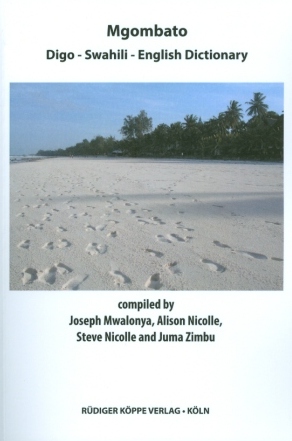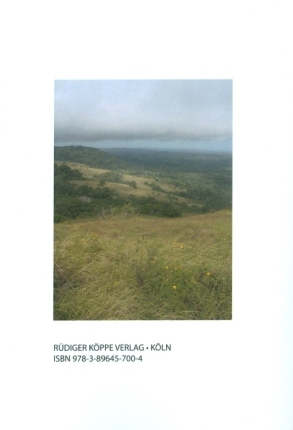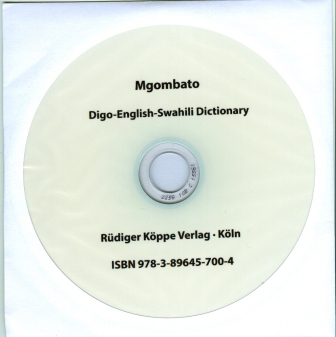


Mgombato – Digo-Swahili-English Dictionary
with a Concise Grammar of the Digo Language (E.73)
Compiled by: Joseph Mwalonya, Alison Nicolle, Steve Nicolle, Juma Zimbu. Series edited by: Bernd Heine, Wilhelm J.G. Möhlig †.
Series: EALD East African Languages and Dialects Volume 16
201212 pp. Roman, 231 pp.
2nd, completely revised and extended edition
5 tables, 1 figure, appendix: 1. The Digo people and language, 2. Concise grammar of the Digo language, 3. Bibliography, with a CD-ROM: Free application software “Lexique Pro” with the complete lexical entries of the dictionary (5,311) and audio files of 352 Digo words and examples of their use
Text language(s): English
Format: 148 x 210 mm
420 g
Jewelcase or CD-sleeve (Audio-CD)
€ 49.80
Buy 'Mgombato – Digo-Swahili-English Dictionary' as a downloadable PDF document directly from our online shop »
Order 'Mgombato – Digo-Swahili-English Dictionary' as print edition »
The Digo / Chidigo language is a Bantu language classified as E.73 (Guthrie) or North-East Coast (Nurse). The Digo people are the second largest of nine coastal ethnies known as the Mijikenda, and are concentrated in the coastal area and eastern slopes of the coastal hills from Mombasa, Kenya, south to Tanga, Tanzania. According to Digo oral tradition the Mijikenda migrated in the 16th and 17th centuries from a place in present-day Somalia. There are estimated to be about 360,000 Digos in Kenya and Tanzania. The Digo people refer to their language as Chidigo, according to the Bantu word style using prefixes to indicate manner or way, including way of speaking.
The present dictionary has been compiled as part of the ongoing work of the Digo Language and Literacy Project, which is part of Bible Translation and Literacy (East Africa), a Kenyan non-governmental organisation which exist to promote the use of the local languages in education, community development, and religious activities. Digo has various dialects, which differ in both pronunciation and the words used. Although the authors have not attempted to standardise Digo in any way, the dictionary reflects the fact that the Digo Language and Literacy Project has been most active in the area at the coast (15 km south of Mombasa) and the near inland, 20 km from the coast.
This dictionary is trilingual, listing the Digo words and phrases alphabetically, and definitions of these words and phrases are given in English and Swahili. There is no reverse list of English and/or Swahili, because it would inevitably omit many Digo words for which there is no obvious English or Swahili equivalent. The work is completed by a brief Digo people description, a grammatical sketch and a bibliography.
The included CD-ROM (version/release 2012) offers free access to the 5,311 entries of the dictionary, furthermore it contains 352 audio files of Digo words and examples of their use.
Please note that the software included in the CD-ROM reflects the technical standards of 2012, and therefore may be no more runnable/useable on computers of today, due to the continuously developed further operating systems since then!
The present 2nd edition is an extended and fully revised version of the 1st edition of 2006. More information you will find on www.chidigo.com.
Under these links you will find grammatical descriptions, dictionaries and text collections of the Mijikenda languages and of further east and central African Bantu languages:
Accompanying material:
- A Grammatical Sketch of Chindamba
(ISBN 978-3-89645-706-6 ) - Atlas of Kamba Dialects (Kenya Bantu E.55)
(ISBN 978-3-89645-708-0 ) - Bantu Languages
(ISBN 978-3-89645-705-9 ) - Kinyamwezi
(ISBN 978-3-927620-40-7 ) - Mpoto Fables and Folktales (N.14, Tanzania)
(ISBN 978-3-89645-738-7 ) - Phonology and Morphology of Ekegusii (E.42)
(ISBN 978-3-89645-026-5 ) - Swahili Phonology Reconsidered in a Diachronical Perspective
(ISBN 978-3-927620-38-4 ) - The Bantu Languages of the Kenya Coast
(ISBN 978-3-89645-716-5 ) - The Ha Language of Tanzania
(ISBN 978-3-89645-027-2 ) - The Kagulu Language of Tanzania (G.12)
(ISBN 978-3-89645-704-2 ) - Wörterbuch Kinyarwanda–Deutsch
(ISBN 978-3-89645-588-8 )
Cross-reference:
- A Grammatical Sketch of the Lusaamia Verb (E.34/J.34)
(ISBN 978-3-89645-546-8 ) - Domains and Regions in Bantu Tense and Aspect
(ISBN 978-3-89645-772-1 ) - Igikuria Phonology and Morphology (E.40)
(ISBN 978-3-89645-029-6 ) - Issues in Bantu Tonology
(ISBN 978-3-89645-033-3 ) - Legenden, Märchen und Fabeln aus Ruanda
(ISBN 978-3-89645-743-1 ) - Mwera–Swahili Dictionary (P.22) / Kamusi ya Kimwera–Kiswahili
(ISBN 978-3-89645-711-0 ) - Swahili Plants
(ISBN 978-3-927620-89-6 ) - Tales, Fables and Narratives of Rwanda
(ISBN 978-3-89645-745-5 ) - Wörterbuch Swahili-Deutsch
(ISBN 978-3-89645-165-1 ) - Wörterbuch Swahili-Deutsch
(ISBN 978-3-89645-415-7 ) - Zwei Elefanten
(ISBN 978-3-89645-021-0 )
| « back | Print version | [top] |
 Books
Books Audio
Audio Biographies
Biographies Series
Series Festschrifts
Festschrifts Journals
Journals